Review: Get Up and Go to Encore Performing Arts' HEAD OVER HEELS at Orlando Shakes' Margeson Theater
A crowd-pleaser from beginning to end, HEAD OVER HEELS is brought to life with the same verve and vigor I've come to expect from Encore Performing Arts

They say you can't teach an old dog new tricks, yet that is exactly what the intrepid team behind HEAD OVER HEELS sought to do. The 2018 musical retells Sir Philip Sidney's Old Arcadia by way of Shakespearean line delivery and the music of The Go-Go's. To better understand the span of time all this covers: what you're watching is a story set Before the Common Era, told through late-16th century prose, and punctuated at the narrative's high points by late-20th century pop songs. Ancient Greece, iambic pentameter, and '80s punk pop are disparate elements which come together in a way that, honestly, should not work. Sometimes, it doesn't. I'm not afraid to admit that. But for much of its two-act story, HEAD OVER HEELS manages to keep its audience invested in the trials and tribulations of the royal family of Arcadia. This mythical kingdom somewhere in southern Greece was meant to represent a utopia on the verge of collapse, thanks to four prophecies by a non-binary oracle. The king seeks to keep his throne, his two princess daughters struggle to balance the duties of their titles with the desires of their hearts, and a young shepherd discovers the joys of cross-dressing.
They never taught that in my freshman year English class. In fact, up until last night, I had never heard of Sir Philip Sidney. The public school literary canon tends to focus on the Shakespeares and the Steinbecks, the Cathers and the Woolfs. Yet Philip Sidney's epic series of poems and sonnets were the inspiration of well-known plot points in William Shakespeare's Greatest Hits. As a pre-cursor to the more popular Billy, Philly's work inevitably lead to comparisons to the better-known romantic comedies such as A Midsummer Night's Dream and Twelfth Night. Lovers lost in the forest, late-night assignations with unexpected partners, and casually swapping gender identities for the sake of love. HEAD OVER HEELS is not a direct adaption of Sidney's work, moreso an approximation that preserves the basic structure.
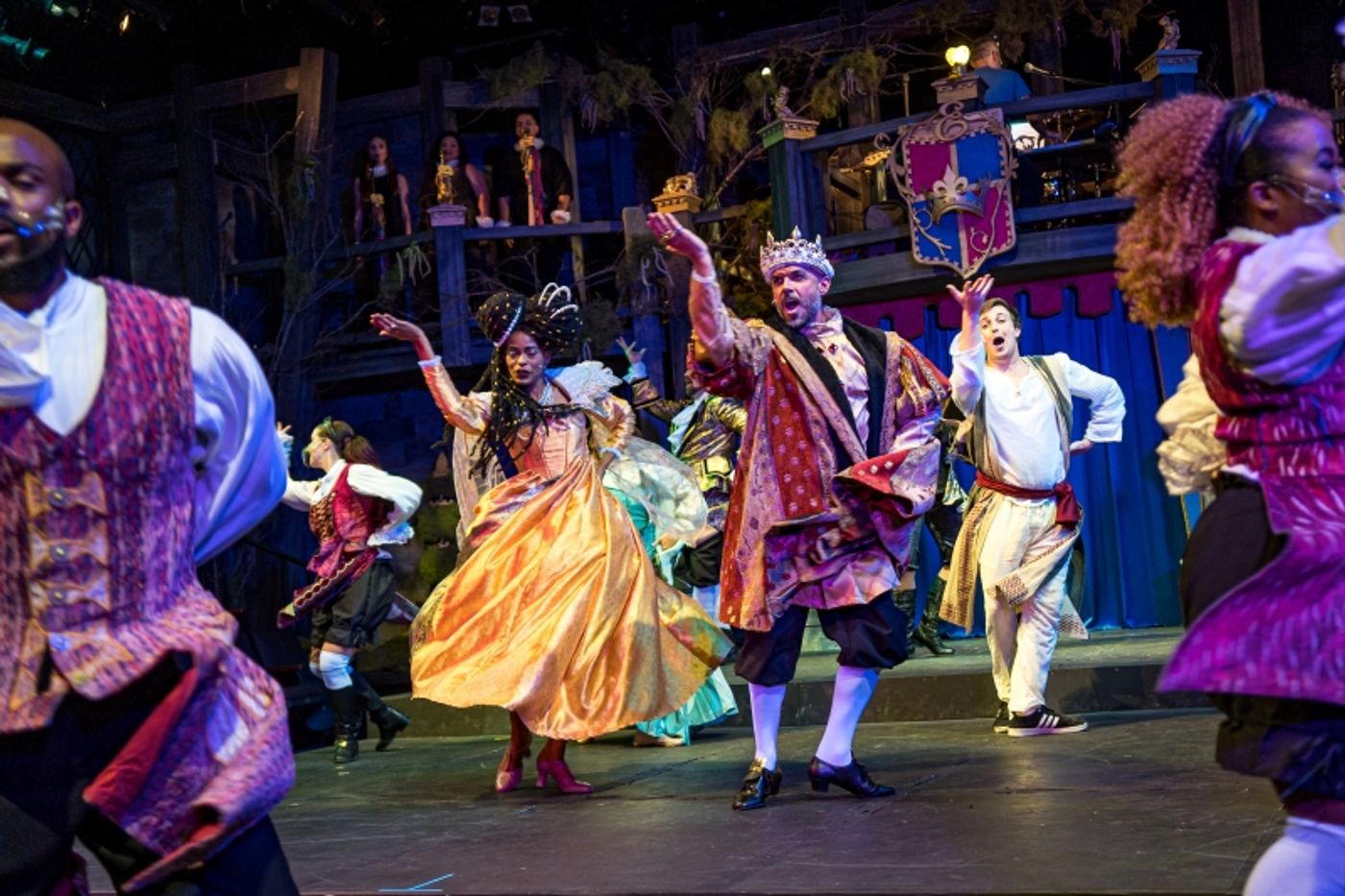
King Basilius (Shea Rafferty) pays a visit to Pythio (Kevin Meza), a non-binary oracle who shares four prophecies that will spell ruin for the kingdom, each relating to the members of Basilius' family, along with himself. In an effort to prevent the prophecies from coming true, Basilius takes the queen Gynecia (Lillie Eliza Thomas) and two daughters Pamela (Marissa Volpe) and Philoclea (Laurel Hatfield) into the forest under the guise of hunting a golden stag. In reality, Basilius plans to keep a watchful eye over them, lest anyone stray and allow the prophecies to come true. Assisting Basilius is his loyal servant Dametas (Matthew Warfield), a widower whose daughter Mopsa (Michie Aranguren) tends to the elder princess Pamela.
The very beautiful Pamela has turned down many suitors, never feeling that special spark of love between herself and any of them. She is a few steps behind everyone else in realizing where her affections actually fall, though Mopsa does her best to guide her toward the conclusion that she, herself, also shares. Conversely, the self-described plain Philoclea has felt the spark of love with her childhood friend Musidorus (Michael Angelini, Jr.), a simple shepherd who the king deems unworthy of marrying the princess. In the hopes of proving himself to the king, Musidorus follows the royal family into the Arcadian forests, donning the disguise of an Amazon warrior named Cleophila. As Cleophila, Musidorus saves the family from a terrible beast and earns their trust to join them on the quest. Although Cleophila tries to romance Philoclea, (s)he unintentionally also stirs the lusty desires of both the king and queen - the latter who discovers his secret but not his identity.
Like a Shakespearean play of its time and in its truest form, HEAD OVER HEELS is bawdy, raucous, and loud. The humor isn't afraid to go a little more juvenile than necessary, and the performers knowingly respond to the room's energy with lines written specifically for audience reactions. A crowd-pleaser from beginning to end, HEAD OVER HEELS is brought to life with the same verve and vigor I've come to expect from Encore Performing Arts, the theatre company that's comprised of Disney cast members giving their free time all for the benefit of their creation. The principal cast here features a mix of reliable Encore veterans and exciting newcomers, some of which I'd seen in other theatrical venues.
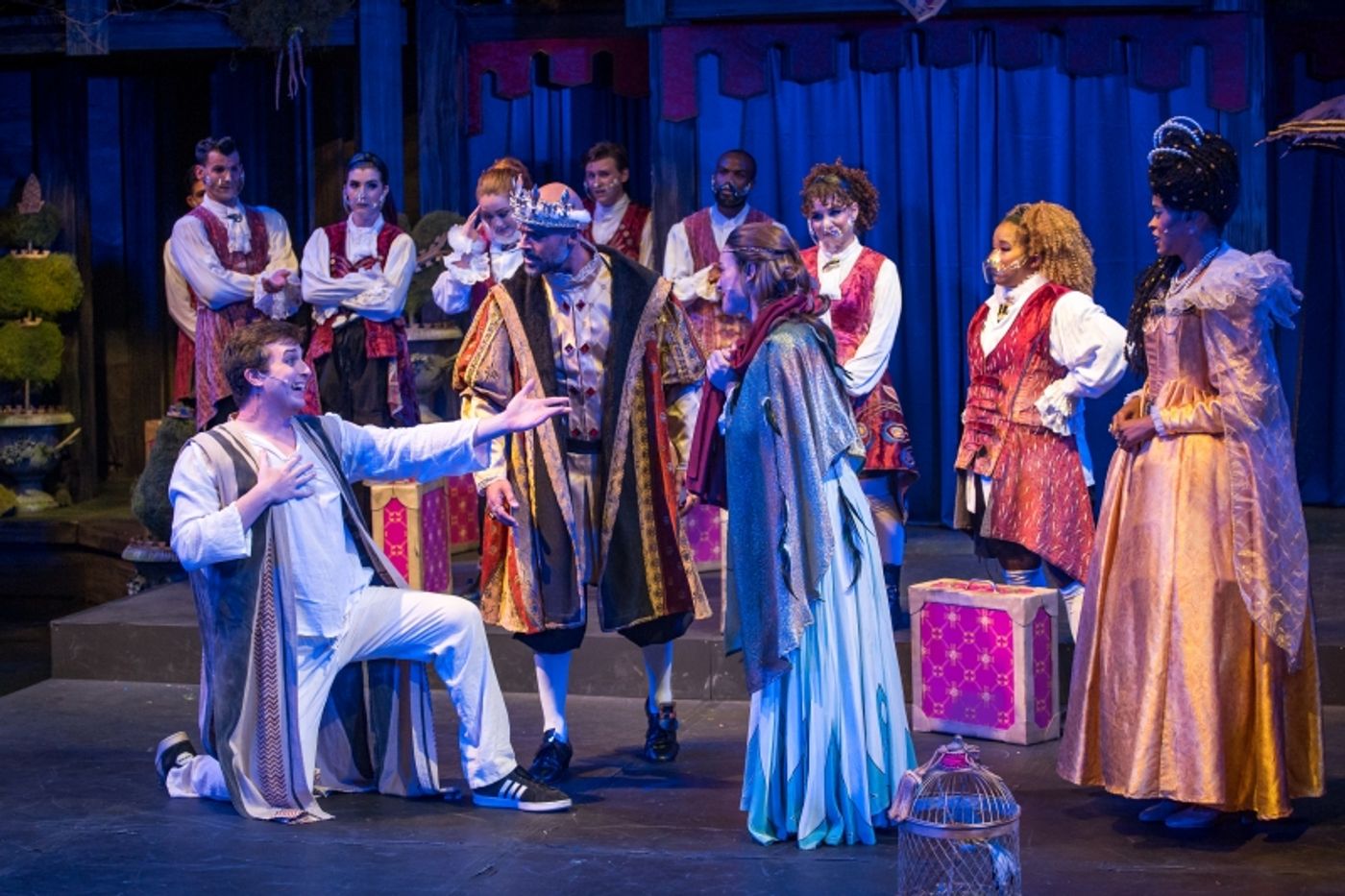
I've already come to expect a great performance from Michael Angelini, Jr. after having already seen him in two previous Encore productions. He plays up both the masculine and feminine sides of Musidorus with aplomb and ease. Turning up the dramatics with the best of them is Marissa Volpe as Pamela, a strong performer whose role requires a precision in both comic deliveries and dramatic revelations. And the standout from beginning to end is the Queen herself, Lillie Eliza Thomas. I had the good fortune of watching her play Audrey in the Orlando Shakes outdoor production of Little Shop of Horrors a few weeks before she took on Gynecia. The pipes she brought to Audrey is also used to great effect here with three Act II numbers that showcase her powerful vocals, including the Belinda Carlisle power ballad "Heaven is a Place on Earth."
One concern I did have, which likely was due to the acoustics of the theatre, was that the vocal ensemble occasionally got lost among the orchestrations. With the majority of songs in the musical being of the boisterous 1980s power ballad variety, all the vocal performers had to crank themselves up to eleven just to do the songs justice. Yet the synth-synth, bang-bang of the band sometimes ended up overpowering not just the ensemble on the balcony, but also the principals out on the thrust stage. It became a sing-off between voice and instruments, as each tried to dominate over the other. Much of the audience relished in it, whooping and cheering after each number as if they were at a live Go-Go's concert.
In the midst of the aural intensity fighting for dominance on the stage, we also have a very talented dance ensemble whose primary goals on the stage are more physical than vocal. Thus, they need to sell their minor characters as best they can without a voice of their own. The dancers convey their own personal histories and motivations through body language, with numbers that help move the themes of the piece forward. You notice little things at first, a lingering look, then flirtatious touching . Traditional couplings among the dancers shifted throughout so that by the play's end, each dancer was with a different partner than they had started. The new couplings between Scotti Stoneburner and Krystal Rajkowski, then later Jared Warren and Jose Rangel, did not go unnoticed as they helped suggest the fluidity among all the ensemble and the message of universal love in the play itself.
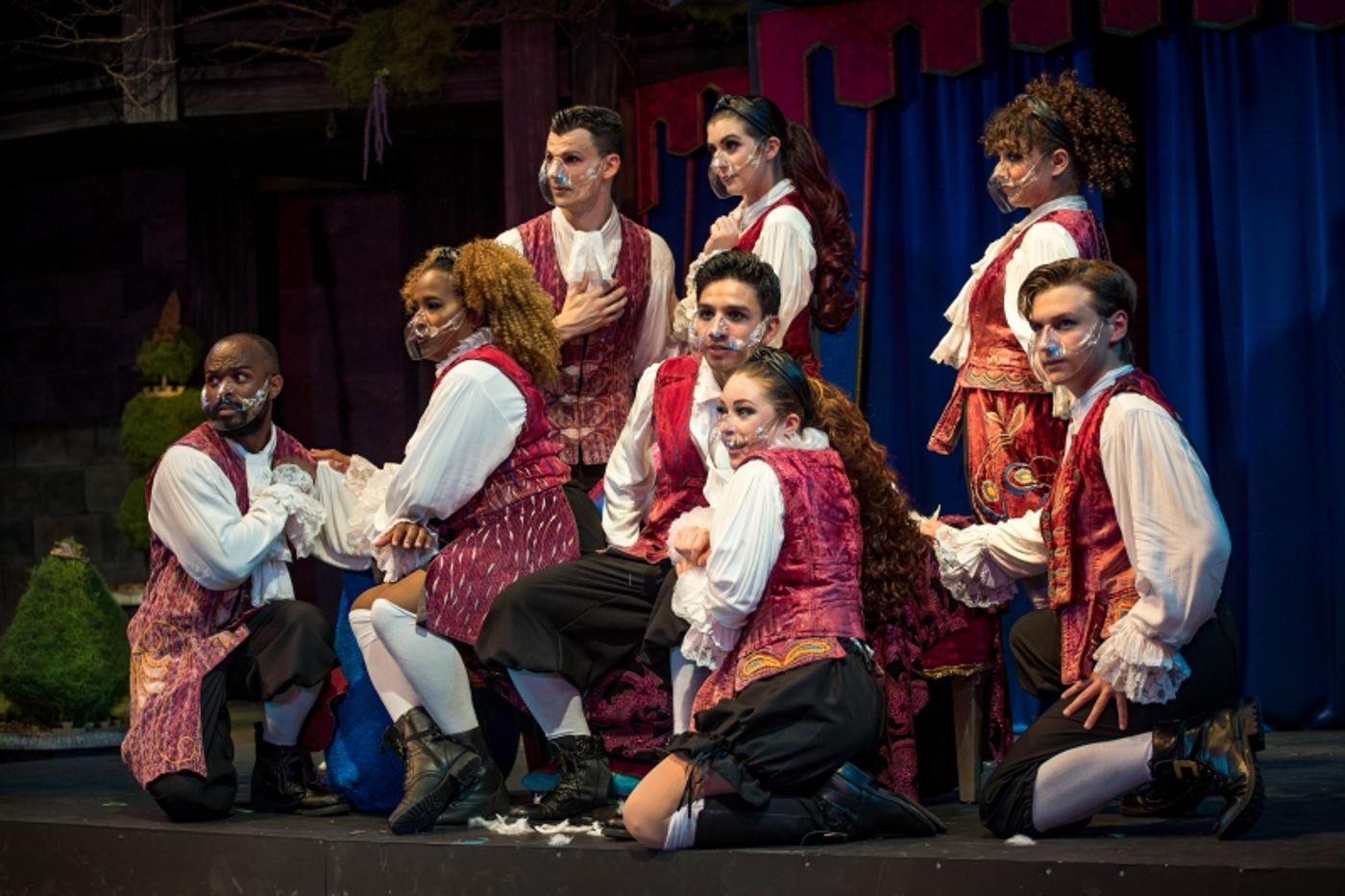
Over the past six years, I've seen Encore productions in at least four different venues, where they always manage to adapt their new stages to the shows they've gifted to the Central Florida audiences. The space that Encore works with this time is the Margeson Theatre at the John and Rita Lowndes Shakespeare Center - better known as the home of Orlando Shakes. I've been to this theatre several times over, most recently in the pre-COVID days of their "Fire and Reign" series last year with Henry IV, Part 1. The stairway I waxed nostalgic about then is now gone, its purpose having been fulfilled and now replaced by the forests of Arcadia. True to Shakespearean's time, much of this forest is implied as the set design is minimal. Large vases potted with moss and grass help signify the forest, as movable pedestals make the audience imagine each location. This production pays more focus to the costumes - primarily designed by the late AJ Garcia.
Garcia's early sketches can be found in the final page of the program, along with a heartfelt tribute extolling the virtues of his work. Truly, the costumes were the highlight of the technical design in Encore's production. The aforementioned dance ensemble begins in unisex costumes that allow for both the functionality of their choreography and, again, the fluidity of gender presentation. Even in second-act stages of undress, the ensemble's costumes still maintain the unisex fluidity that justifies when each dance partner swaps with another. As a thematic response to the interchangeability of the ensemble, each member of the royal family have their own unique costume, while royal servants Dametas and Mopsa have clothes cut from the same cloth - signifying their familial connection as well as their status among the Arcadian court.
It took me a little longer than I should have to realize that the costume design also was meant to actually emulate what Shakespearean performers would have worn on stage at The Globe Theatre, when the company wore vibrant and colorful pieces that were still of the same fashion of their times and not necessarily "screen accurate" to the time/place of their plays. Thusly, although HEAD OVER HEELS is set in Ancient Greece, it's also "set" in 16th century England. And then there's that other, still difficult to justify, layer of The Go-Go's songs added to the mix.
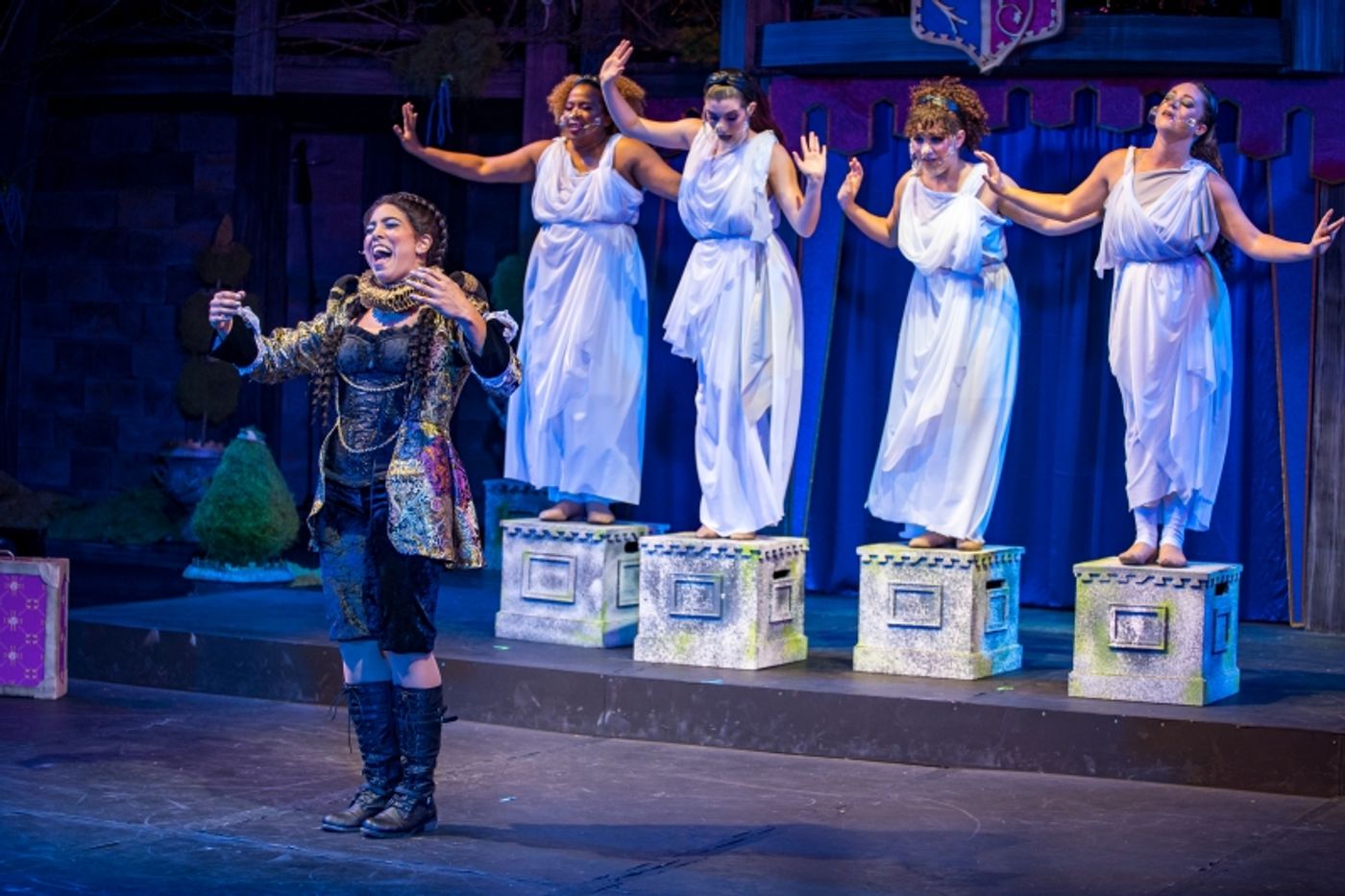
I have to admit, I'm not fully versed in the discography of The Go-Go's, at least not beyond the big hits that, upon hearing, I usually just remark, "Ohhh, that song again!" Thus, the majority of their songs have no context for me beyond what HEAD OVER HEELS has given. For me, it's something of a Singin' in the Rain effect. As someone whose first exposure to the songs of that jukebox musical film were strictly within the 1952 narrative context, I don't have any built-in nostalgia or recognition of their original renditions from the 1920s/30s. I generally prefer listening to the film's "cover" versions as a result. Likewise, aside from knowing that "We Got the Beat" and a few other songs are from the 1980s, the majority of HEAD OVER HEELS' musical numbers seemed suitable for an Old Arcadia narrative even if they weren't written as such. But you can tell when songs were inserted simply for the audience to recognize them. The flimsiest of threads may weave the song lyrics to the narrative. It's apparent in a song like "Automatic Rainy Day," which I felt was easily just another 80s pop song and not necessary for the story. Regardless if the song works or not, the presentations and vocals were entertaining enough.
Entertaining enough is usually the best way to describe jukebox musicals. They are otherwise difficult to judge because the audience is asked to recontextualize a familiar property into a new narrative. Yet it is the audience's familiarity with the property that allows them to either appreciate or revile its new context. Speaking as someone who otherwise has no nostalgia for a song like "This Old Feeling," I probably wouldn't have been as upset to hear it in the new context of a married couple planning to cheat on each other. As I said before, the musical seems to be aware that songs are chosen because they're known, counting on the audience's recognition to strengthen its use. One such example is Musidorus' sad attempt to first sing "Mad About You" and requesting that the conductor re-start it, still failing to perform the song. A few minutes later, he sings it perfectly without the help of the band, with a cheerful audience applauding at the second attempt, knowing they were going to now get the song they know in the way it's meant to be sung.
That's also, perhaps, the fatal flaw of jukebox musicals. When the audience already knows what songs are coming and how they are supposed to feel, whatever dramatic tension the narrative might have held could conceivably be lost. Songs that already suggest joy or happiness basically prescribe such feelings to the audience within the opening notes. It's Pavlovian in a sense, as soon as they hear certain chords, they perk up and expect a musical treat. To its credit, HEAD OVER HEELS does play to literary tradition by offering a peripetetic moment in the final act that swiftly turns a show that mostly a romantic comedy into a straightforward tragedy. And with that comes a Go-Go's song that is most radically recontextualized to suit the needs of the story. The usually-mellow "Here You Are" from their 2001 album traditionally feels miles away from their 1980s rock sound, but within HEAD OVER HEELS is played with the power ballad vibe that ironically functions more as a funereal elegy, now drawing tears instead of cheers.
I wasn't expecting that moment. And it came not only within the context of the play itself, but also in Encore Performing Arts' decision to select the play for production during the second weekend in June given the local history of Orlando. The show's themes about love and acceptance for all makes it a very fitting production to mount during Pride month. But it also comes with the bittersweet remembrance of a night five years ago in our town, when forty-nine people were killed in a horrific shooting at the Pulse nightclub. Suddenly, the HEAD OVER HEELS mantra of maintaining a Beat takes on so many more meanings. Throughout the play, many assume the Beat is more about keeping that funky dance going, the rhythm of their perfect little kingdom. But - in my reading of it now - Arcadia needed to maintain its heartbeat by accepting all forms of love. To have such a Beat ripped away so tragically and needlessly as was done five years ago tonight is devastating.
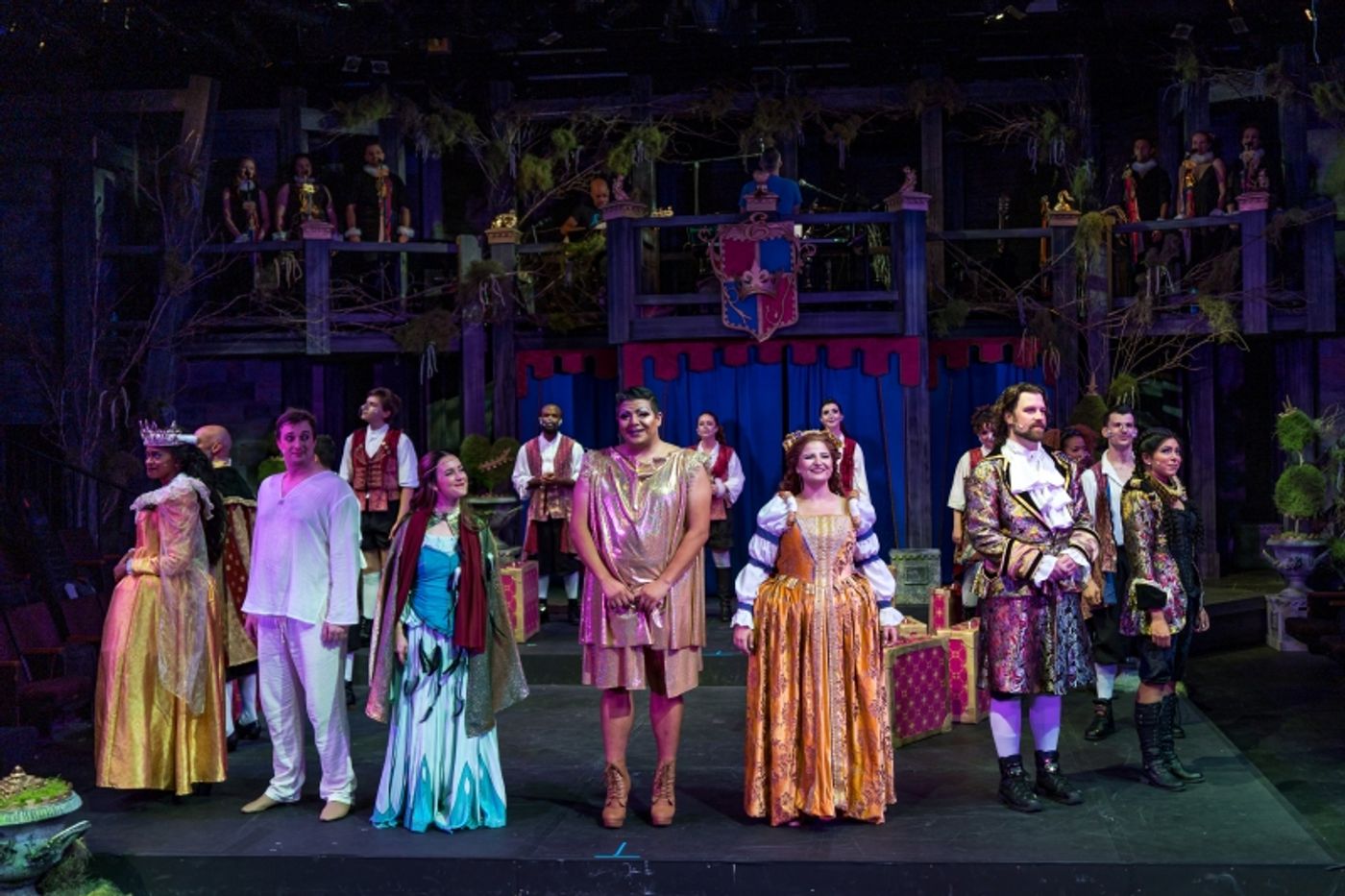
In that peripetetic moment of HEAD OVER HEELS, I suddenly was back in 2016, awakening on the Sunday morning to the news of the shock from the night before, then immediately worrying if anyone I knew might have been there. The days that followed then were such a blur; I remember going to a Mad Cow Theatre production of Avenue Q, with its own ribald humor helping the audience to forget for a couple hours what happened a couple blocks down. And I remember a week or so later seeing a local production of Spring Awakening the same night a memorial was started outside Dr. Phillips Center. Most of all, I remember how the city, my city, came together to stand up to hate. Each and every day, the people of Orlando memorialized the dead, to remember the good they gave to the world, and to block out the hate that led to their passing.
Encore Performing Arts gives back to their community with every show they perform. It may be through donations or through time or through educational opportunities. But they also give back a hope that the audience needs, a reassurance that - after two hours through the emotional wringer be it pleasure or sorrow - everything will be okay by the story's end. Their selection of HEAD OVER HEELS for Pride Month was a wise choice. A crowd-pleaser from beginning to end, it gave its audience an energy and a spark of joy that helped provide more senses of normalcy in the post-COVID world, whilst also being a fittingly thematic selection given this month's cultural significance. But mostly, it was a wise choice because it allowed Encore Performing Arts to return with the right show at the right time with the right audience to collectively remind ourselves that love is always better.
Tickets for this weekend's final performances of HEAD OVER HEELS can be purchased here.
Photos by Tiffany Bagwell, used with permission.
Reader Reviews
Videos

